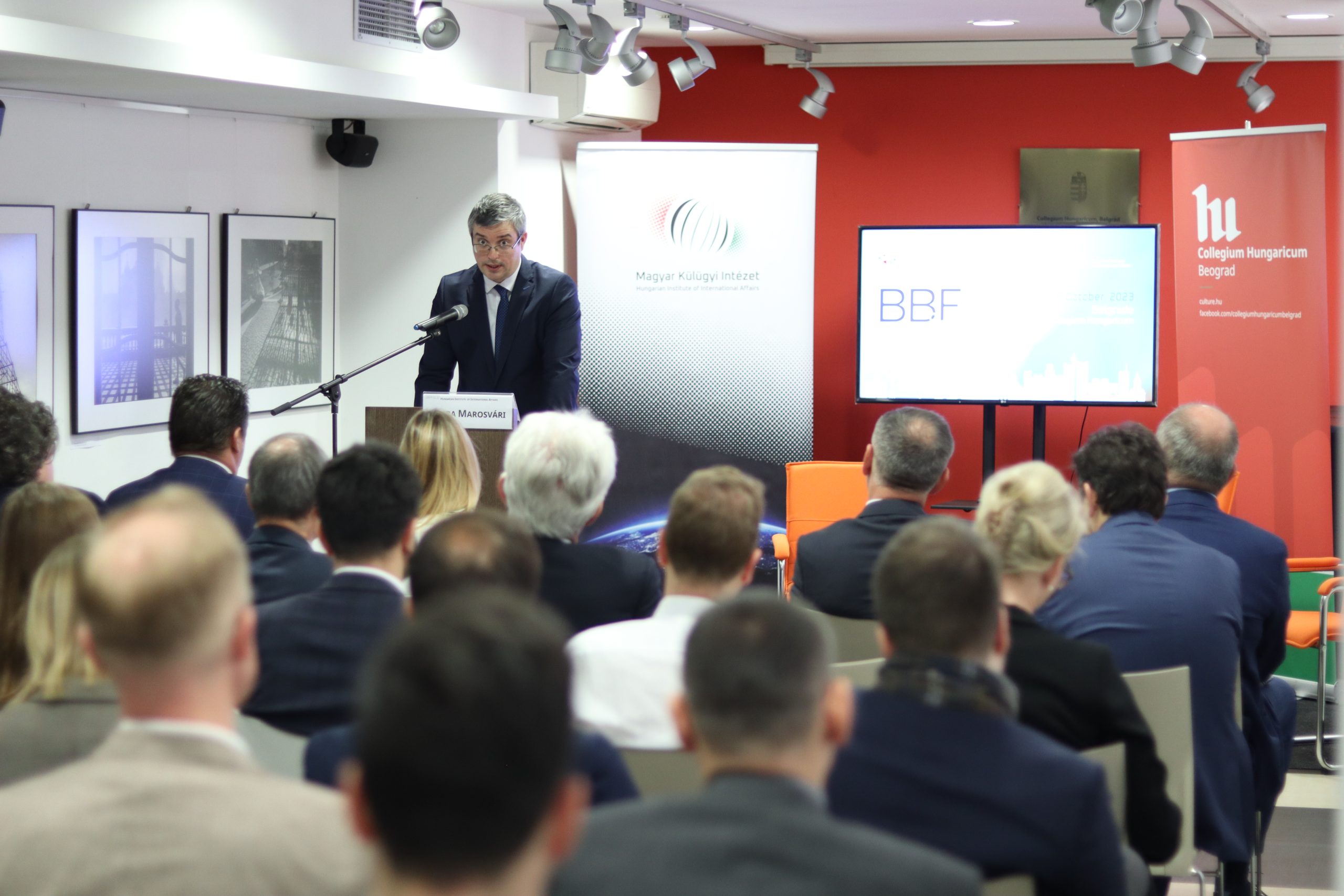The programme series of the Hungarian Institute of International Affairs (HIIA) entitled Budapest Balkans Forum on Tour (BBF On Tour) continued in Belgrade on 25 October 2023. The event was organized with the support of the Embassy of Hungary in Belgrade, while the venue was provided by the Collegium Hungaricum. At the event entitled “Energy Security and Diversification in the Shadow of the New Geopolitical Context”, Serbian and Hungarian speakers discussed the current challenges facing the energy sector.
Regarding the BBF On Tour Márton Schőberl, Chief Executive Officer of HIIA emphasized that discussing regional issues is inconceivable without the involvement of the Western Balkans. In his welcome speech, József Magyar, Hungary’s Ambassador to Serbia emphasized the importance of the cooperation between the two countries, in which one of the priority areas is energy policy.
The welcome speeches were followed by keynote speeches from government representatives. Jovana Joksimović, Assistant Minister in charge of International Cooperation and European Integration of the Ministry of Mining and Energy of Serbia stated out that Serbia’s goal is to achieve energy independence in the cheapest possible way. In connection with energy independence, the diversification of resources was mentioned both in terms of natural gas and crude oil. In the case of the former she emphasized the establishment of connections with Bulgaria, North Macedonia and Romania, and in the case of the latter the same kind of process with Hungary. Joksimović also mentioned the energy poverty affecting Serbian households as a local problem, and the Israeli-Palestinian conflict as an event threatening the global energy supply. At the same time, she indicated that the bilateral relations between Serbia and Hungary are at a historical peak.
Csaba Marosvári, Deputy State Secretary for Energy Security of Ministry of Foreign Affairs and Trade began his keynote speech by stating that energy security cannot be taken for granted. In this regard, he highlighted the similarity between Serbia and Hungary in terms of the high rate of exposure to energy imports and praised the bilateral relations of the two countries, which are based on pragmatism. This pragmatic and good relations are underscored by the fact that, in addition to Hungary’s own supply, it also stores natural gas for Serbia too. The deputy state secretary underlined that Serbia is a reliable partner for Hungary and that the cooperation enables the two countries to strengthen their energy market and security situation.
After the two keynote speeches, the event continued with a panel discussion, with the participation of Milan Zdravković, Executive Director of JP Srbijagas, and Lajos Bütösi, President of the Supervisory Board of SERBHUNGAS d.o.o. Novi Sad Long Terms Sales and Supply Director of MVM CEEnergy Zrt.. The panel discussion was moderated by Anna Orosz, Research Fellow of HIIA, on the topics of the green transition, liquefied natural gas (LNG) and the role of energy companies.
In connection with the green transition, Milan Zdravković emphasized the need for accessible, sustainable and cheap energy for the region’s development. He also highlighted that even though natural gas can play an important role in the green transition, there is no uniform solution for its use applicable to all countries. In connection with this topic, Bütösi Lajos recalled the infrastructural deficiency of the region, which is especially evident regarding to natural gas, in terms of pipelines and LNG capacities. At the same time, he also pointed out that the European Commission is constantly reducing the subsidies available for the development of gas infrastructure.
Elaborating on the topic of LNG in more details, Bütösi confirmed his earlier statement that the region is lagging behind in this area. Although both Greece and Croatia are building new capacities and expanding existing ones, in overall those are currently limited and expensive. Complementing what has been said earlier, Zdravković highlighted the difficulties behind storing LNG and, in a broader sense, the issue of the interconnectivity of natural gas networks, especially with regard to the delivery of gas to end users. To this, Bütösi added that there would be a great need to create north-south natural gas transport routes at the regional level, for which his Serbian partner cited this year’s agreement between Serbia and North Macedonia on the interconnector to be built between them, as an example which fits into this idea.
In relation to the creation of SERBHUNGAS, Bütösi pointed out that the joint venture will allow the parties to act together in the markets covered by the two companies – which affect approximately 70 million inhabitants – and to optimize the use of their resources.
The round table discussion was followed by expert commentaries. András Jenei, energy policy expert, Deputy Director Centre for Fair Political Analysis, Hungary gave a holistic overview of the topic, highlighting geopolitical, economic and weather related factors at the same time, including, for example, Huntington’s theory about the clash of civilizations, which, according to him, can also be projected onto the events in Israel and Ukraine, or the shale revolution that took place in the United States of America, thanks to which the USA managed to change from a net gas importer to a net gas exporter.
Nevena Šekarić Stojanović, Research Fellow at Institute of International Politics and Economics, Serbia presented from a constructivist perspective how energy policy got into a geopolitical context and as a result of that how the area became more and more the subject of securitization. Focusing on the Western Balkan region, Šekarić outlined several defining trends, which included the already mentioned energy poverty, the prominent role of coal in energy production to this day in which investments continue to come, and China’s presence which is manifesting in investments around energy infrastructures.
For more details about the next stops of the BBF on Tour event series, visit the official website of the Budapest Balkans Forum.
For more information about the Budapest Balkans Forum, follow us on social media.

